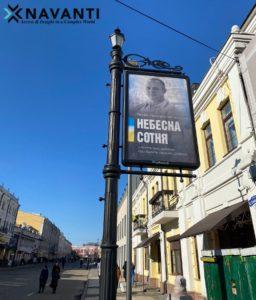What Our Analysts Are Reading – Feburary, 2022
 Navanti’s data collection and analysis are based on networks of on-the-ground researchers from all walks of life: journalists, academics, and humanitarian workers, to name a few. Our analysts also keep abreast of open source reports to inform their work. Below, these analysts have summarized and contextualized the most important pieces they have read and listened to over the past month.
Navanti’s data collection and analysis are based on networks of on-the-ground researchers from all walks of life: journalists, academics, and humanitarian workers, to name a few. Our analysts also keep abreast of open source reports to inform their work. Below, these analysts have summarized and contextualized the most important pieces they have read and listened to over the past month.
Food Security
The Ukraine-Russia conflict threatens global food security at a time when food prices have already been pushed to record levels due to the economic impacts of the coronavirus pandemic. Known as Europe’s breadbasket, Ukraine is among the top five wheat exporters worldwide, and is also a top exporter of corn, barley, and rye. In 2020, Ukraine exported around 18 million metric tons of wheat, supplying a significant amount to countries in the Middle East and North Africa. Tunisia relies on Ukraine for over 50 percent of its wheat imports, half of all wheat consumed in Lebanon in 2020 originated in the Ukraine, and Yemen sources around 22 percent of its wheat imports from Ukraine. Though this year’s wheat harvest, which starts in July, is expected to produce good yields, a protracted war in the country could impact the harvest levels and reduce supplies, further increasing global food prices and pushing already economically-depressed countries in the Middle East and North Africa towards a food security crisis.
Furthermore, Russia is the world’s top wheat exporter and its natural gas exports account for about 20% of global supplies and 40% of the European Union’s supplies. In addition, Russian fertilizer exports account for over 15% of the global supply, with some countries reliant on over 60% of their fertilizer imports on a Russian supply. Sanctions imposed on Russia, such as the expulsion of some Russian banks from the international SWIFT banking system in response to the attack on Ukraine, are expected to impact exports, which could significantly impact global food supplies, associated transport costs, and agricultural production.
Already in 2022, wheat prices have increased 37 percent. Bread is a politically-charged staple commodity throughout the world, and experts warn that rising prices could spark revolt. Several popular uprisings throughout history, such in Egypt and Tunisia in the 70s and 80s and the Arab Spring in the early 2010s, were preceded by increases in bread prices. In order to offset some of the strain on the global market, it is likely that American wheat farmers will increase production, leading to profits for larger American agribusinesses.
Mozambique
Despite the deployment and continued involvement of foreign troops in the fight against the Al Shabaab insurgency in Cabo Delgado province, Mozambique, the conflict continues and is even expanding into other provinces. Although foreign and national forces have retaken control over parts of the territory, the main sources of funding for the insurgency are local, and the conditions that allowed the insurgency to flourish, such as the socioeconomic marginalization of the region, have not been addressed. This threatens to allow the insurgency to thrive, despite military efforts to prevent its expansion.
Russia
Russia commenced a large-scale invasion of Ukraine on 24 February 2022. The Institute for the Study of War and the American Enterprise Institute’s Critical Threats Project have been releasing daily conflict updates and maps of Russian control of Ukrainian territory. As the war continues to escalate, these resources act as a valuable tool for monitoring the war’s developments and provide vital visualization of the Russian push.
Turkmenistan
On the eve of fresh presidential “elections”, many questions remain about the man guaranteed to win the election on 12 March, Serdar Berdymukhamedov. Serdar, the son of current president Gurbanguly Berdymukhamedov, currently serves as de-facto vice president and is reportedly a change from his father, whose love of horses, dogs, and stunt doubles is well documented in Turkmen state media. The implications of the transition of power could be very significant for Central Asia, as the hermit kingdom controls vast amounts of natural gas wealth and only trades with China. Should Serdar take a modern, open view on ruling, Turkmenistan could engage with a plethora of actors throughout Eurasia, using its natural gas reserves to cultivate ties that would shift the geopolitics of the region. While Serdar declared in a campaign speech he would transform the country, he did not give a concrete plan of action. However, with the past two Turkmen leaders in mind, one shouldn’t hold their breath in expecting a change from the status quo.
Women
The author of “Queering Women, Peace and Security” evaluates the Women, Peace, and Security (WPS) framework through a queer lens. In this evaluation, the author points out both the harms of excluding the LGBTQ+ community from this framework, as well as the ways in which applying a queer lens to this framework enhances it by highlighting the ways in which assumptions about masculinity and femininity influence security operations, particularly with regards to sexual and gender-based violence.
Yemen
Mohammed Hamoud of Middle East Eye profiles one of Yemen’s growing number of female beekeepers. A woman in Sana’a has turned her passion for bees into a successful business selling honey and hives. Selling hives to others can enable new entrants to the livelihood of beekeeping. Her success story shows that increased women’s participation in a traditionally-male dominated livelihood in Yemen can serve to support and expand livelihood opportunities for others. While a 2020 UNDP beekeeping value chain study found that only 16% of study participants had employed a woman in their beekeeping-related business, the numbers of women beekeepers are growing, primarily raising bees close to home.

